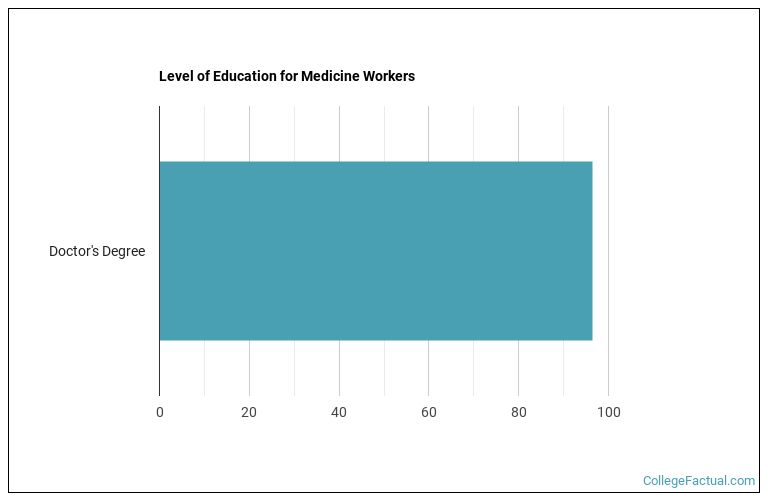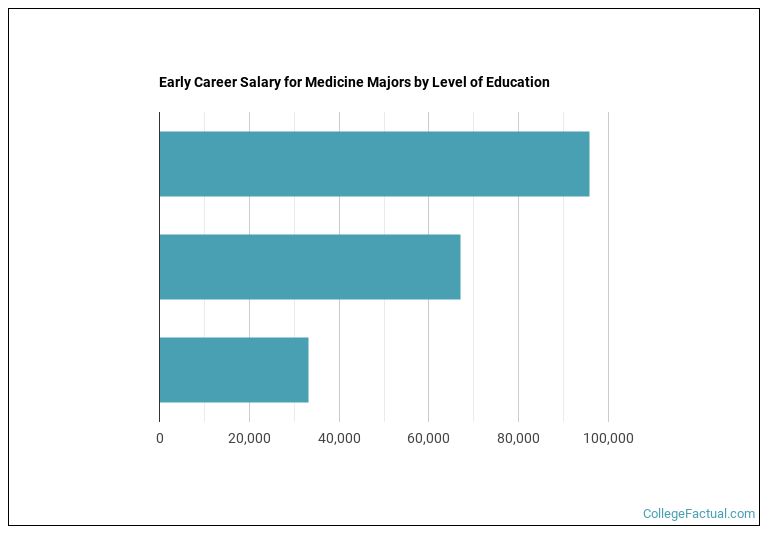 by our College Data Analytics Team
by our College Data Analytics TeamIn 2021-2022, medicine was the 40th most popular major nationwide with 29,089 degrees awarded.
This year's Best Medicine Schools ranking compares 128 of them to identify the best overall programs in the country. Explore this or one of our many other custom medicine rankings further below.
Medicine majors are found most commonly in careers in which using logic and reasoning to identify the strengths and weaknesses of alternative solutions, conclusions or approaches to problems is important. Giving full attention to what other people are saying, taking time to understand the points being made, asking questions as appropriate, and not interrupting at inappropriate times and considering the relative costs and benefits of potential actions to choose the most appropriate one are all required skills for careers related to this major.
New students will need to have completed high school or a GED program and each school will have their own minimum GPA and SAT/ACT test requirements. Specific medicine careers may require a certain level of degree attainment or additional certifications beyond that.
There are many different medicine degree levels. Medicine programs offered by schools range from a to a , which is the highest medicine degree you can get. Depending on the medicine degree you choose, obtaining your diploma can take anwhere from 1 to 4+ years.
| Degree | Credit Requirements | Typical Program Length |
|---|---|---|
| Associate Degree | 60-70 credits | 2 years |
| Bachelor’s Degree | 120 credits | 4 years |
| Master’s Degree | 50-70 credits | 1-3 years |
| Doctorate | Program required coursework including thesis or dissertation | At least 4 years |
A doctor's degree is the most common level of education achieved by those in careers related to medicine, with approximately 65.4% of workers getting one. See the the most common levels of education for medicine workers below.
| Level of Education | Percentage of Workers |
|---|---|
| Doctoral Degree | 65.4% |
| Post-Doctoral Training | 31.1% |
| Post-Master’s Certificate | 3.5% |
96.5% of medicine workers have at least a doctorate. See the chart below for the most common degree level workers in medicine have received.

The education level required is different depending on the medicine career you are seeking.
Want a job when you graduate with your medicine degree? Medicine careers are expected to grow 12.1% between 2016 and 2026.
The following options are some of the most in-demand careers related to medicine.
| Occupation Name | Projected Jobs | Expected Growth |
|---|---|---|
| Physicians and Surgeons | 414,700 | 11.4% |
| Family and General Practitioners | 154,100 | 14.3% |
Medicine graduates between <nil> reported earning an average of $66,249 in the <nil> timeframe. Earnings can range from as low as $33,290 to as high as $95,680. As you might expect, salaries for medicine graduates vary depending on the level of education that was acquired.

Salaries for medicine graduates can vary widely by the occupation you choose as well. The following table shows the top highest paying careers medicine grads often go into.
| Occupation Name | Median Average Salary |
|---|---|
| Family and General Practitioners | $211,780 |
| Physicians and Surgeons | $203,880 |
With over 205 different medicine degree programs to choose from, finding the best fit for you can be a challenge. Fortunately you have come to the right place. We have analyzed all of these schools to come up with hundreds of unbiased medicine school rankings to help you with this.
Medicine is one of 34 different types of Health Professions programs to choose from.
| Major | Annual Graduates |
|---|---|
| Medicine | 20,851 |
| Osteopathic Medicine/Osteopathy | 7,699 |
| Podiatric Medicine/Podiatry | 539 |
| Related Major | Annual Graduates |
|---|---|
| Nursing | 319,502 |
| Health & Medical Administrative Services | 88,600 |
| Practical Nursing & Nursing Assistants | 85,339 |
| Allied Health Professions | 83,905 |
| Allied Health & Medical Assisting Services | 83,587 |